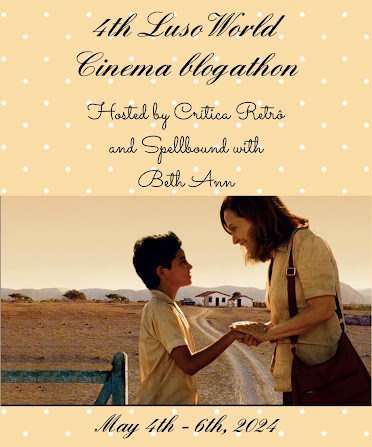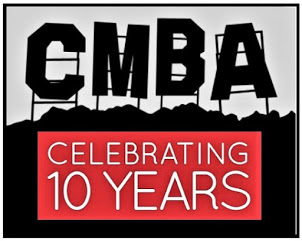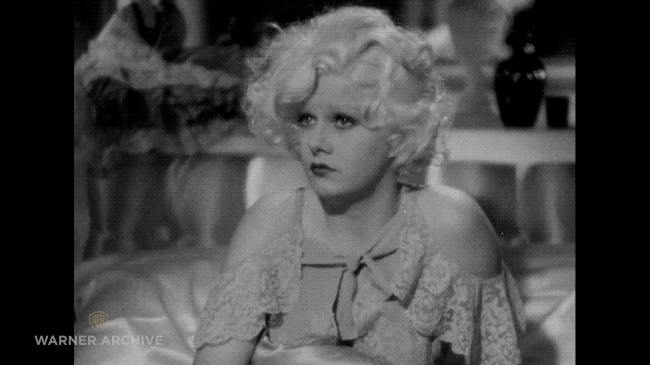
Ethel Waters (L) tries to save Eddie “Rochester” Anderson from himself. Image: Yooniq Images
Cabin in the Sky (1943) has always been a controversial musical.
Because it features an entirely African-American cast, it was banned in several U.S. cities when it was first released. It remains controversial today because of its use of black stereotypes.
Having said that, our goal is to look at individual aspects of this film, as part of the Vincente Minnelli Blogathon. Cabin in the Sky is Minnelli’s first full feature film as a director.
Minnelli explained his approach to the film in his autobiography, I Remember it Well. “If there were any reservations about the film,” he wrote, “they revolved around the story, which reinforced the naive, childlike stereotype of blacks. But I knew there were such people as [these characters]…If I was going to make a picture about such people, I would approach it with great affection rather than condescension.”
Is the film condescending? We think so. Does it portray black stereotypes? Yes. Should it be discounted from Minnelli’s (and Hollywood) history? We don’t think so, and here’s why.
One reason is the cast. The heart of the film is the fabulous Ethel Waters, who has charisma to spare and ought to have been a much bigger movie star. Her husband, played by Eddie “Rochester” Anderson, is a man with perfect comic timing. Plus, there’s the glamorous Lena Horne, and our new fave, Rex Ingram, who plays a sharply-dressed, smarty-pants villain.

Lena Horne (seated) is the boss and she knows it. Image: BAM
A second reason is the script. This is a story about God and Lucifer fighting over the soul of a wayward man (Anderson). But Anderson’s wife (Waters) is a pious woman who believes the goodness in her husband will prevail. It’s the familiar Good vs. Evil scenario, served with great music and witty lines.
In one scene, Anderson decides he’s going to Change His Ways and give up gambling. When he goes to church, he tells the pastor, “Reverend, when you call on the sinners to confess, you better give me the rest of the evening.”
Alas! Anderson is hauled out of church by his gambling creditors, who want him to recoup his (their) losses in a high-stakes game. Robinson tries to dodge them:
Robinson: “Right now I’ve got an appointment with Repentance.”
Creditor: “You can get saved any day. An opportunity like this comes once.”
A third reason is Minnelli’s direction. You can tell this film was based on a stage play, but it doesn’t feel static or hemmed-in, like some stage-to-film productions. Everything is beautifully filmed, from Cedric Gibbons‘ set design to Irene‘s costumes. This is no low-budget enterprise.

Rex Ingram’s Lucifer (centre) hates to lose. Image: AllPosters
Cabin in the Sky is Minnelli’s redemption parable: It’s ordinary people who are worth fighting for.
We know this by watching Waters’ character, a woman who is poor and black and ignored by Society At Large. However, Waters, who fought to expand her character’s role, makes us believe she can the world. She sees the extraordinary in the ordinary and fights to preserve it.
Minnelli doesn’t subvert Waters, nor does he mock her character. She is someone to be reckoned with; even Ingram’s Lucifer realizes that. Waters’ character is the remarkable woman this story needs her to be.
Cabin in the Sky is far from a perfect movie. Yet, because it has an all-black cast, this Vincente Minnelli film remains a rarity in mainstream American cinema history.
Notes:
- Read TCM’s overview HERE.
- Click HERE for a review of a modern production of the original stage play.
- Click HERE for BET’s list of the greatest black musicals.
Cabin in the Sky: starring Ethel Waters, Eddie “Rochester” Anderson, Lena Horne. Directed by Vincente Minnelli (and an uncredited Busby Berkeley). Written by Joseph Schrank. Metro-Goldwyn-Mayer, 1943, B&W, 98 mins.
This is part of The Vincente Minnelli Blogathon hosted by Love Letters to Old Hollywood. Click HERE to see more fab entries!














Splendid account, Ruth! I’ve never seen this — I generally run a mile from musicals — but you’ve got me tempted. Hm.
LikeLiked by 1 person
The cast alone is worth the price of admission, in my opinion, especially Ethel Waters. And the music! I’m not much of a musical fan, either, but I’ve wanted to see this one for a long time, and I’m glad I did.
LikeLike
Thank you for discussing such an important Minnelli film! It’s interesting that this is what he chose to be his directorial debut, and that he recognized how stereotypical the characters were. I’ve always wished that Lena Horne had been treated better in Hollywood and this film shows why she should’ve been. Such a fascinating character.
Thanks again for helping me out with my first blogathon! Much appreciated!
LikeLiked by 2 people
I agree that Lena Horne should have been much more respected in Hollywood. She had the looks and the talent. She’s utterly fabulous in this film, isn’t she?
Thanks for hosting this blogathon. It’s giving me a whole new appreciation for Minnelli’s work.
LikeLiked by 1 person
I had no idea this movie existed, and I love a good musical!
Thanks for this post! 🙂
LikeLiked by 1 person
I hope you get the chance to see it. Such an incredible cast, and some very funny lines.
LikeLike
Always been afraid to watch this one–admired the effort, worried about the execution. This gives me a reason to get past my hesitation, as I can’t resist those kind of witty remarks, and have always wanted to watch Waters at work.
LikeLiked by 1 person
I cringed a few times during this film, but a person really ought to see Ethel Waters here. She’s charismatic and talented – and her character is someone a person would love to know in real life.
LikeLike
Cabin in the Sky is one of my favourite musicals. I have loved it since childhood when it introduced me to so many marvelous performers. In the history of stage to screen musicals this rates as tops.
LikeLiked by 1 person
There are so many incredible aspects to this film – the script, the music, the cast, the costumes. Like you said, it’s a superior stage-to-screen adaptation.
LikeLike
Interesting. Great review. And I love this: “It’s ordinary people who are worth fighting for.”
LikeLiked by 1 person
Even though the film has cringing moments, I feel overall it offers an inspiring and hopeful message. And it made me an instant fan of Ethel Waters and Rex Ingram.
LikeLiked by 1 person
FWIW, I’m black and this movie doesn’t offend me at all. I think it’s great. Ethel Waters shines. I wrote a post about her last year, and you’re right, she was a totally underrated star. She has great chemistry with Anderson, and Horne makes for a fine contrast. CABIN is in the tradition of old Negro folk tales, so yeah, the characterization is broad, to say the least, but I thought Minnelli treated the material with respect.
LikeLiked by 1 person
I’m so glad to hear you say that, Rich. As for Ethel Waters, I was instantly enamored with her.
LikeLike
Since I greatly enjoyed Stormy Weather a few months ago, I should give a chance to this film in the future. I have no doubt it’s historically significant, yet with some stereotyping. I really enjoyed this article!
Kisses!
Le
LikeLiked by 1 person
Thanks, Le. There are a lot of things to appreciate about this film, because it seems like everyone who worked on it was incredibly talented.
LikeLike
You had me at “All-Black Musical”!! Even though it stereotypes Black characters, you’ve pointed out some good reasons to watch ‘Cabin in the Sky’!! Am surprised I’ve never heard of it!!
Kudos to Vincente Minnelli for bringing out a controversial film, back in the 1940’s!!!
LikeLiked by 1 person
I’m surprised, too, because your film knowledge is so vast. However, I hope you have the chance to see this. So much talent here. 🙂
LikeLiked by 1 person
I’m not at all familiar with this film, Ruth, but I have seen this scene with Lena Horne. Damn! What a beauty with a voice to match. So very talented. I’m glad to have read this review. Had I stumbled upon this movie on my own, I probably would have shut it down once the stereotypes came into full view. Now, thanks to you, I’ll be able to look beyond them to discover the film’s merits — and Lena Horne. Did I mention how gorgeous she was? Her voice? 🙂
LikeLiked by 1 person
Haha! This movie has incredible talent, not the least of which is Lena Horne. If you’re a fan of hers – and who isn’t – you’ve got to see it! She’s fabulous as a femme fatale.
LikeLike
Your review is right on the money — “far from a perfect movie,” but a must-see nonetheless.
I would also include in the “must-see” category HALLELUJAH (1929), the first all-black cast movie. In his autobiography A TREE IS A TREE, director King Vidor writes, “For several years I had nurtured a secret hope. I wanted to make a film about Negroes, using only Negroes in the cast. The environment of my youth in my father’s east Texas sawmill towns had left many indelible memories of the colored man, and I had heard my sister rocked to sleep each night to one of the best repertoires of Negro spirituals in the South. The answer from the studio executives to my pleading had always been a positive no. Now, with sound pictures, I had a new argument….” And what a wonderful, even loving, film he made! Modern eyes may quibble with its dated aspects, but this is a much better film than CABIN IN THE SKY, in my opinion.
LikeLiked by 2 people
“Hallelujah” has been on my Must Watch List for some time, and I came across a decent online version last week. I’ll be seeing it soon, and the research you shared in King Vidor will be helpful while watching. Thanks!
LikeLiked by 2 people